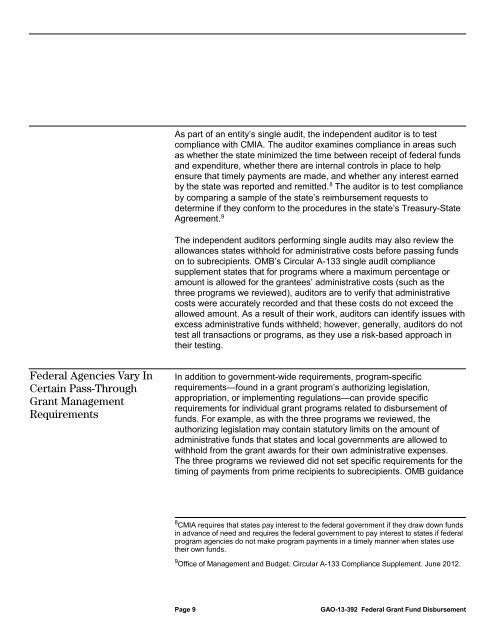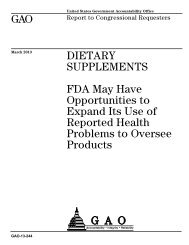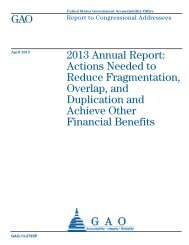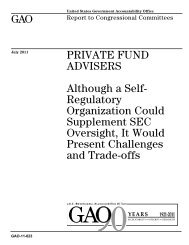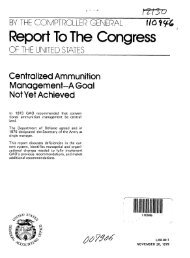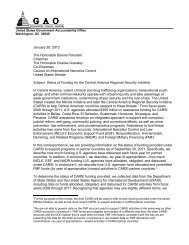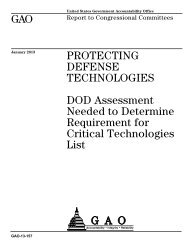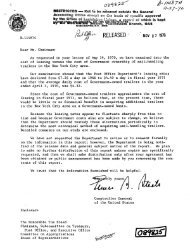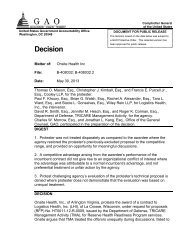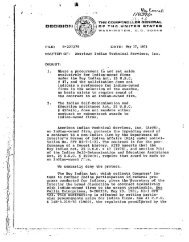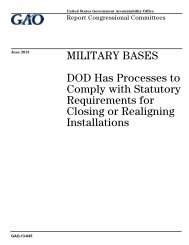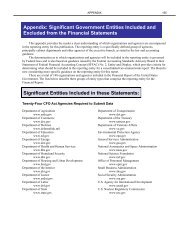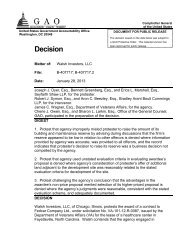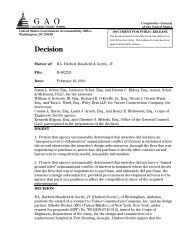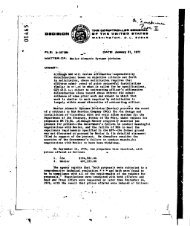GAO-13-392, Grants Management - US Government Accountability ...
GAO-13-392, Grants Management - US Government Accountability ...
GAO-13-392, Grants Management - US Government Accountability ...
Create successful ePaper yourself
Turn your PDF publications into a flip-book with our unique Google optimized e-Paper software.
As part of an entity’s single audit, the independent auditor is to test<br />
compliance with CMIA. The auditor examines compliance in areas such<br />
as whether the state minimized the time between receipt of federal funds<br />
and expenditure, whether there are internal controls in place to help<br />
ensure that timely payments are made, and whether any interest earned<br />
by the state was reported and remitted. 8 The auditor is to test compliance<br />
by comparing a sample of the state’s reimbursement requests to<br />
determine if they conform to the procedures in the state’s Treasury-State<br />
Agreement. 9<br />
The independent auditors performing single audits may also review the<br />
allowances states withhold for administrative costs before passing funds<br />
on to subrecipients. OMB’s Circular A-<strong>13</strong>3 single audit compliance<br />
supplement states that for programs where a maximum percentage or<br />
amount is allowed for the grantees’ administrative costs (such as the<br />
three programs we reviewed), auditors are to verify that administrative<br />
costs were accurately recorded and that these costs do not exceed the<br />
allowed amount. As a result of their work, auditors can identify issues with<br />
excess administrative funds withheld; however, generally, auditors do not<br />
test all transactions or programs, as they use a risk-based approach in<br />
their testing.<br />
Federal Agencies Vary In<br />
Certain Pass-Through<br />
Grant <strong>Management</strong><br />
Requirements<br />
In addition to government-wide requirements, program-specific<br />
requirements—found in a grant program’s authorizing legislation,<br />
appropriation, or implementing regulations—can provide specific<br />
requirements for individual grant programs related to disbursement of<br />
funds. For example, as with the three programs we reviewed, the<br />
authorizing legislation may contain statutory limits on the amount of<br />
administrative funds that states and local governments are allowed to<br />
withhold from the grant awards for their own administrative expenses.<br />
The three programs we reviewed did not set specific requirements for the<br />
timing of payments from prime recipients to subrecipients. OMB guidance<br />
8 CMIA requires that states pay interest to the federal government if they draw down funds<br />
in advance of need and requires the federal government to pay interest to states if federal<br />
program agencies do not make program payments in a timely manner when states use<br />
their own funds.<br />
9 Office of <strong>Management</strong> and Budget. Circular A-<strong>13</strong>3 Compliance Supplement. June 2012.<br />
Page 9<br />
<strong>GAO</strong>-<strong>13</strong>-<strong>392</strong> Federal Grant Fund Disbursement


